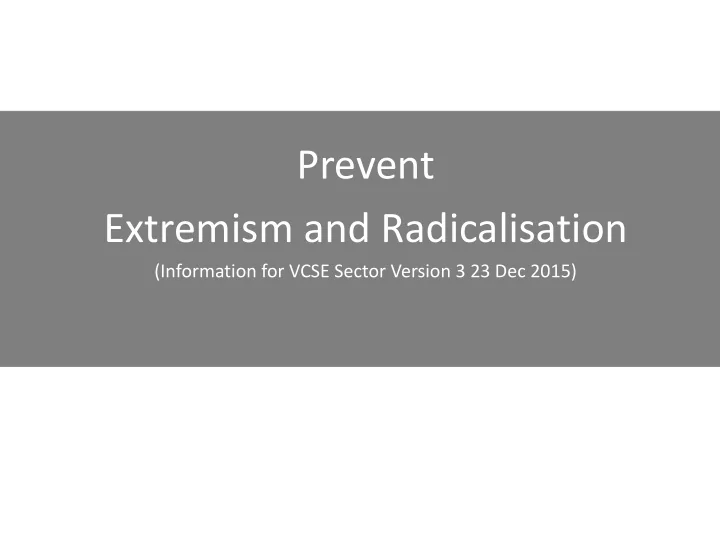

Prevent Extremism and Radicalisation (Information for VCSE Sector Version 3 23 Dec 2015)
Background • The UK faces a continuing threat from both international and domestic terrorism and violent extremism, which can emerge from any community and can be inspired by a wide range of causes. • The current threat from terrorism in the UK can include the exploitation of vulnerable people, including children of all ages, young people and adults and involve them in terrorism or activity in support of terrorism. • People of all ages are being recruited into groups promoting hatred, discrimination and sometimes violence.
What do we mean by… Vocal or active opposition to fundamental British values, including democracy, the rule of law, individual liberty and mutual respect and tolerance of different Extremism faiths and beliefs. We also include in our definition of extremism calls for the death of members of our armed forces, whether in this country or overseas. The process by which a person comes to support terrorism or forms of extremism Radicalisation leading to terrorism Describes the condition of being capable Vulnerability of being injured; difficult to defend; open to moral or ideological attack. Within Prevent , the word describes factors and characteristics associated with being susceptible to radicalisation.
Background • Several hundred young British people have travelled to Syria and Iraq to join IS. Others have been recruited to commit acts of terrorism in this country. • Extremism can take many forms including that linked to Far Right / Neo Nazi / White Supremacist, Al Qaeda ideologies, Irish Nationalist and Loyalist paramilitary groups, and that linked to Animal Rights movements.
What is Prevent? • Prevent is part of the Government’s Counter -terrorism Strategy. • The aim of Prevent is to stop people from becoming terrorists or supporting terrorism.
What is Prevent? • The Counter Terrorism and Security Act 2015 places a duty on public sector bodies to prevent people from being drawn into terrorism. This is known as the ‘Prevent Duty’. • The Prevent Strategy has three elements: Ideology - Challenging the ideology that supports terrorism and the threat faced from those who promote it; Individual - Preventing people from being drawn into terrorism and ensuring they are given appropriate advice and support; and Institution - Supporting sectors and institutions where there are risks of radicalisation.
Why does the Voluntary, Community & Social Enterprise Sector ( VCSE) need to be informed of the Prevent agenda? The voluntary sector is recognised as an important partner in this work due to our work with vulnerable groups
Risks to VCSE Organisations • The risk of infiltration by terrorist – related groups, who wish to gain access to vulnerable service users who could potentially be susceptible to radicalisation. • The risk of being exploited by groups who wish to fund-raise / money launder under a legitimate heading but then use the funds for terrorism related activities. • Altered behaviours/ views of service users who may have been exposed to radicalisation.
How can the VCSE protect itself? Robust governance arrangements Robust recruitment processes including the process for volunteers Staff training on the Prevent agenda
How to refer • Notice - Practitioner has a concern about an individual in relation to radicalisation. • Check - Are there any reasons for the change in behaviour? • Share - Discuss concern with colleagues / safeguarding lead. • Refer - If practitioner still has concerns, contact Staffordshire Police Prevent Team. If you are concerned about someone in relation to radicalisation and extremism and would like to make a referral, please contact the Staffordshire Police Prevent Team: Telephone: 01785 238239 or 01785 233109 prevent@staffordshire.pnn.police.uk Email:
Prevent Referral Process for Staffordshire and Stoke on Trent
What happens when I make a referral? The Prevent Team will assess the referral, collect any necessary information and use this to determine whether the person is appropriate to be referred to Channel. Channel is a multi- agency approach which provides support Channel Panel decides how the individual to individuals who are will be supported and creates an action at risk of being drawn plan. into extremism. In Staffordshire the Channel Panel is chaired by The referring agency may be called upon Staffordshire County to provide information to the Panel and / Council and takes or be part of the intervention. place on a monthly basis. Channel Panel regularly review, monitor progress and manage risk. Want to know more about Channel? Visit the online learning resource: http://course.ncalt.com/Channel_General_Awareness
Contacts and useful resources S taffordshire Police Prevent Team 01785 238239 or 01785 233109 prevent@staffordshire.pnn.police.uk Staffordshire County Council’s Safer Communities Team 01785 854428 becky.murphy@staffordshire.gov.uk VAST 01785 283400 dave.benge@vast.org.uk Support Staffordshire 01543 303030 sandra.payne@supportstaffordshire.org.uk
District and Borough Prevent Leads District District Lead Email Address Cannock Kerry Wright KerryWright@cannockchasedc.gov.uk Steve Shivlock SteveShilvock@cannockchasedc.gov.uk East Staffs Mike Hovers Michael.hovers@eaststaffsbc.gov.uk Sal Khan sal.khan@eaststaffsbc.gov.uk Lichfield Jenni Coleman jenni.coleman@lichfielddc.gov.uk Newcastle Sarah Moore Sarah.moore@newcastle-staffs.gov.uk South Staffs Maggie Quinn m.quinn@sstaffs.gov.uk Stafford Tracy Redpath tredpath@staffordbc.gov.uk Staffs Moorlands David Smith david.smith@staffsmoorlands.gov.uk Tamworth Andrew Barratt Andrew-Barratt@tamworth.gov.uk
Recommend
More recommend